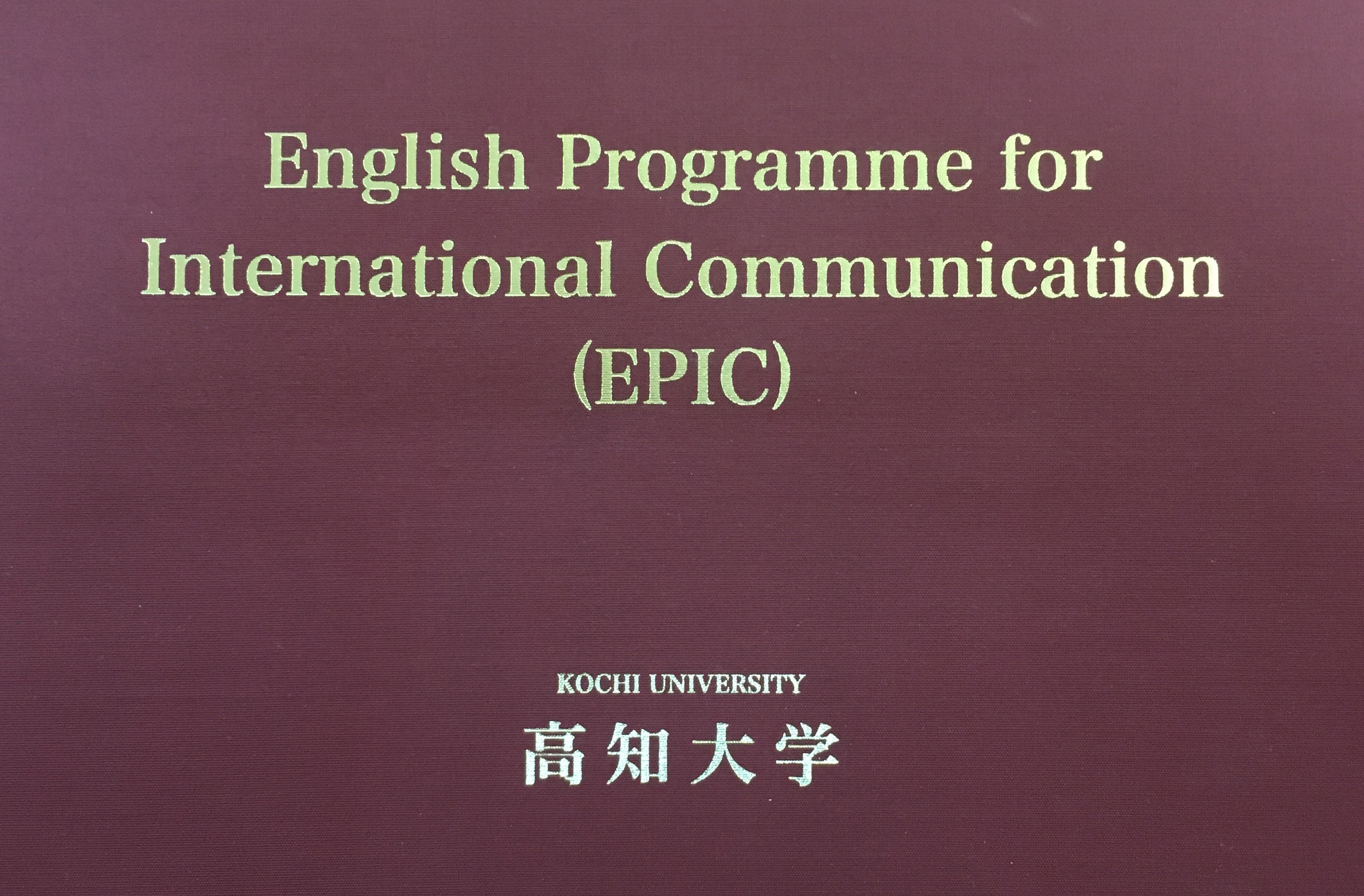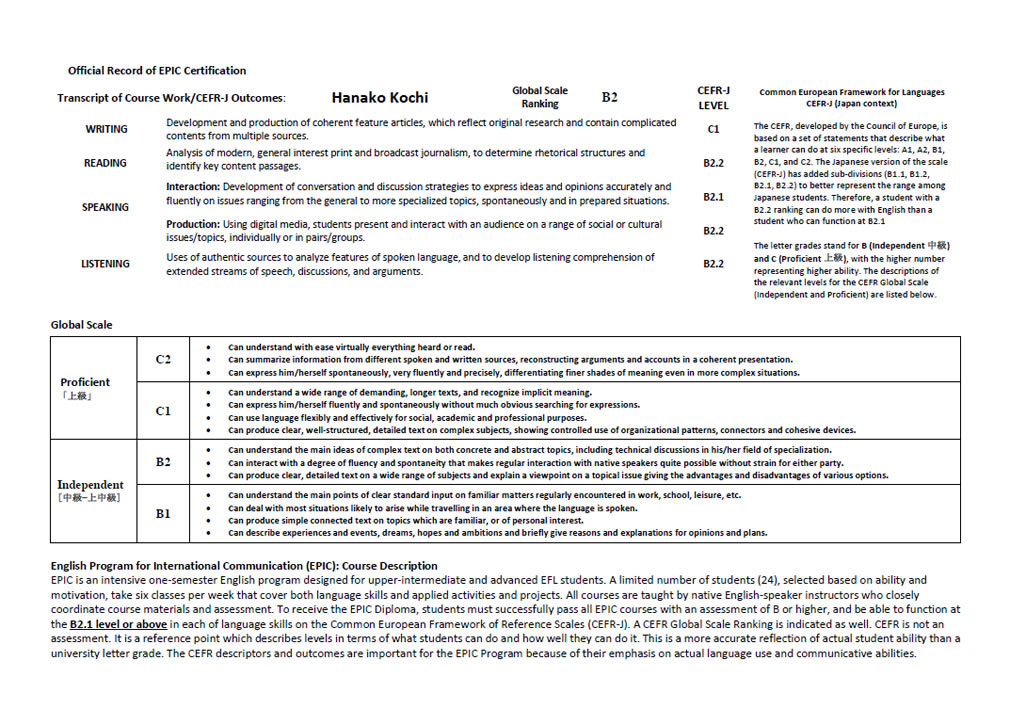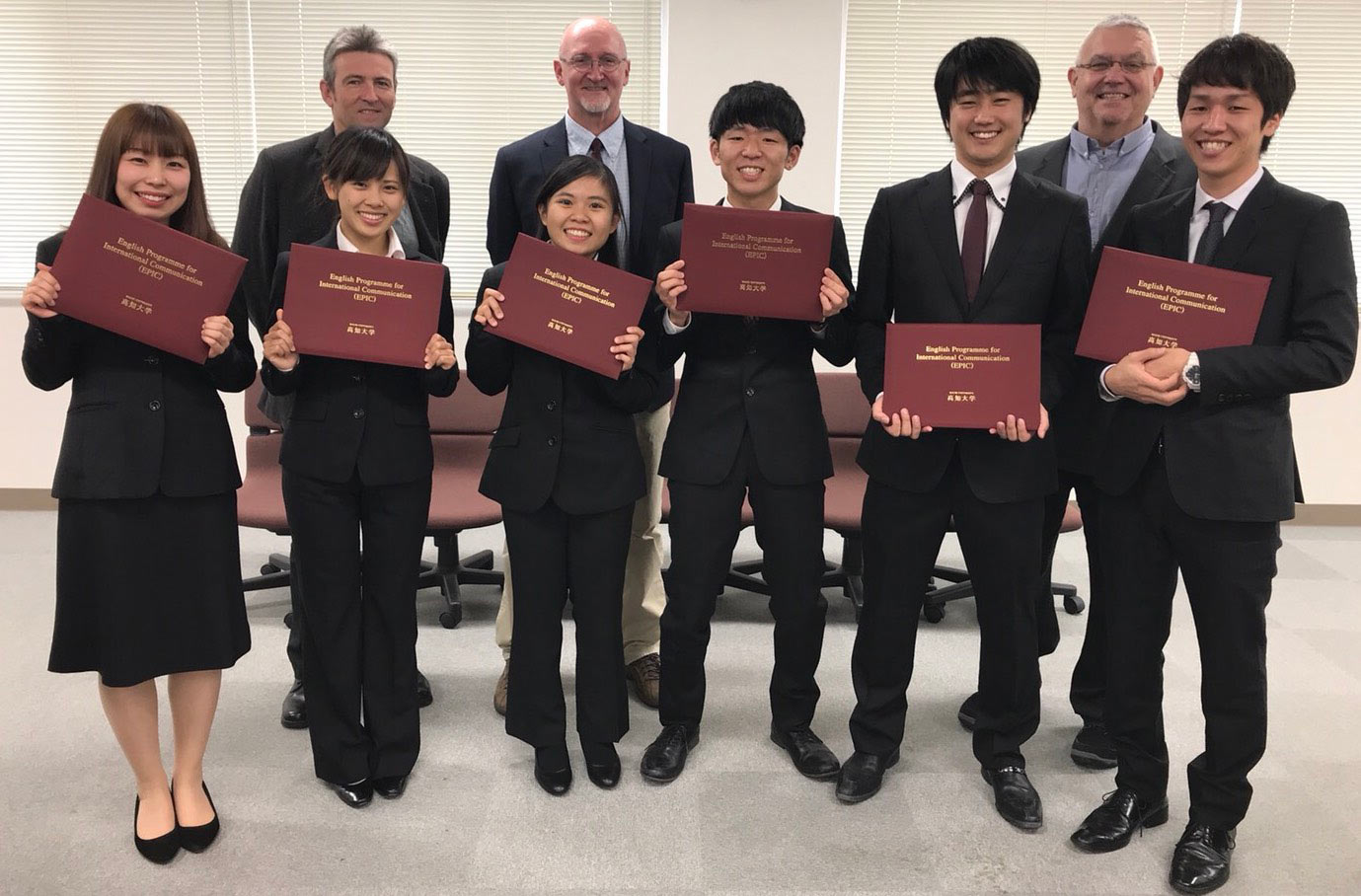国際社会コース International Studies Course
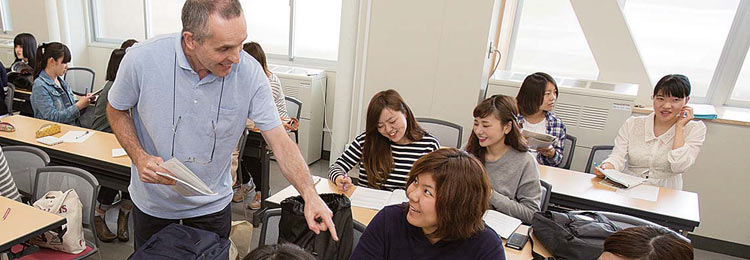
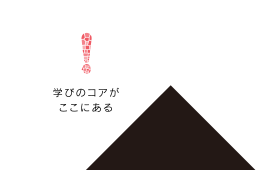


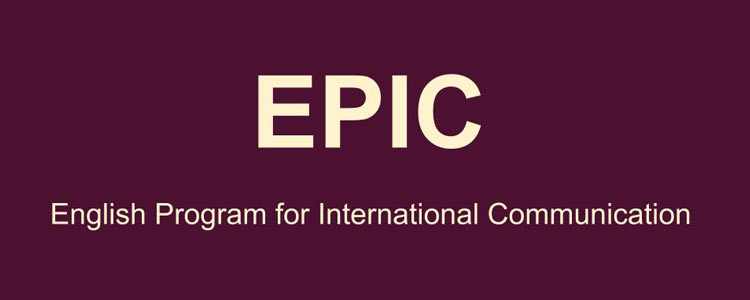
「専門英語Ⅰ(EPIC)」は、中級上・上級レベルの学生のために設計された1学期集中型英語学習プログラムです。学期はじめに適性試験(スピーキングとライティング)を実施し、能力とやる気に基づいて24名までの受講可能学生を選抜します。EPICの内容は、学習意欲を刺激するものですが、かなりの努力を要するものですので、中級上・上級レベルの学生の要求水準に見合うよう構成されています。
EPICは英語4技能(聞く・話す・読む・書く)に関するコースと2つの応用コミュニケーションに関するコース、合計6コースから構成され、これらを1学期間で履修することで、集中的に英語学習ができるようになっています。これら6つのコースはさらに、プロジェクトごとのユニットに分かれています。EPICでは、英語に関する知識、英語4技能、様々な学習活動やプロジェクトを網羅しています。また、多読や自学教材を取り入れ、学習者のさらなる自律性を促しています。3名のネイティブスピーカー教員が綿密に連携して、カリキュラム、教材、成績評価基準を組み立てています。EPICプログラムのすべてのコースにおいて、B(良)またはそれ以上の成績で合格し、CEFR-J (日本版ヨーロッパ言語共通参照枠) に基づいて、レベルB2.1以上の言語運用能力があると判定された学生には、高知大学より特別証明書が授与されます。EPIC特別証明書には、国際共通参照レベルの概要も記載されます。
*EPIC webpage content is primarily in English
EPIC is an intensive one-semester Senmon English program designed for upper-intermediate and advanced EFL students. A limited number (24) of students are selected for the EPIC Program based on ability and motivation. A speaking and writing test is held at the beginning of the semester to determine eligibility for EPIC. The course content is stimulating but demanding, and is structured to satisfy the needs of upper-intermediate students. EPIC is a package of six language-focused courses (four skills-based courses and two applied communication courses) taken over one semester to ensure a high degree of intensity in English study. Each of these courses is further subdivided into project-based modules. EPIC covers language knowledge, all four language skills, and a variety of applied activities and projects. Extensive Reading (ER) and self-access learning are built into the EPIC Program to encourage greater learner autonomy in language study. Three native-speaker instructors closely coordinate curriculum, course material, and assessment. A special certificate from Kochi University is awarded to students who successfully pass all EPIC coursework with a grade of B or higher, and who demonstrate language use at the level B2.1 or above based on the Common European Framework of Reference for Japan (CEFR-J). An overall CEFR Global Scale Ranking is also indicated on the EPIC Certificate.
| Teacher | EPIC Foundation Unit |
Unit 1 (6 classes) | Unit 2 (6 classes) |
|---|---|---|---|
| Darren Lingley (EPIC 1A/1B) |
Self-access learning CEFR_Japan | Speaking I (Interaction) Issues in Contemporary Society/Culture |
Writing II Applied Genre Writing Essays (film reviews) |
| MS Word specifications | Cultural Studies I Gender and Language |
Listening II Authentic listening/Inside the Actors Studio |
|
| Sean Burgoine (EPIC 2A/2B) |
Email communication | Listening I The 1960s Authentic Listening/Cultural Resources |
Cultural Studies II Interview Project Raising Bilingual Children |
| Presentation | Media I TED Talks/Presentations |
Reading II English Debate |
|
| Davey Leslie (EPIC 3A/3B) |
Google Docs Grammarly |
Reading I Rhetorical/Discourse Structures in Newspaper and Magazine Articles |
Speaking II (Production) Poster Presentations |
| Extensive Reading | Writing I Five-paragraph Essay |
Media II Project-based Instruction (Life in Kochi) Writing for Digital Production |
EPIC comprises six basic courses each of which is divided into two smaller learning units for a total of 12 modules. This course structure ensures variation in course material from EPIC instructors leading to higher learner motivation. Each of the three EPIC instructors are responsible for four modules during the semester and students receive instruction in the full range of English competencies. Courses do not run independently; they interlock in terms of content which is closely coordinated by the course instructors through entry level assessment, materials, projects, objectives, and final assessment. The key features of EPIC are intensity, communicative language use, and project-based learning. These features are supported by other key course design features such as the coordination of content and objectives, class size, and the teaching of English in English. EPIC is conceptualized as a second-year bridge course in the English curriculum which leads toward more specialized English study. Students who take EPIC are provided with a full starting assessment of language ability and regular progress assessments throughout the semester. The EPIC course is also designed to place primary focus on the production skills, even when teaching the receptive skills of listening and reading. Such unorthodox course design functions to arouse student interest. Student interest is maintained by progressing and succeeding through a series of projects and attainable mini-goals from the smaller modules.
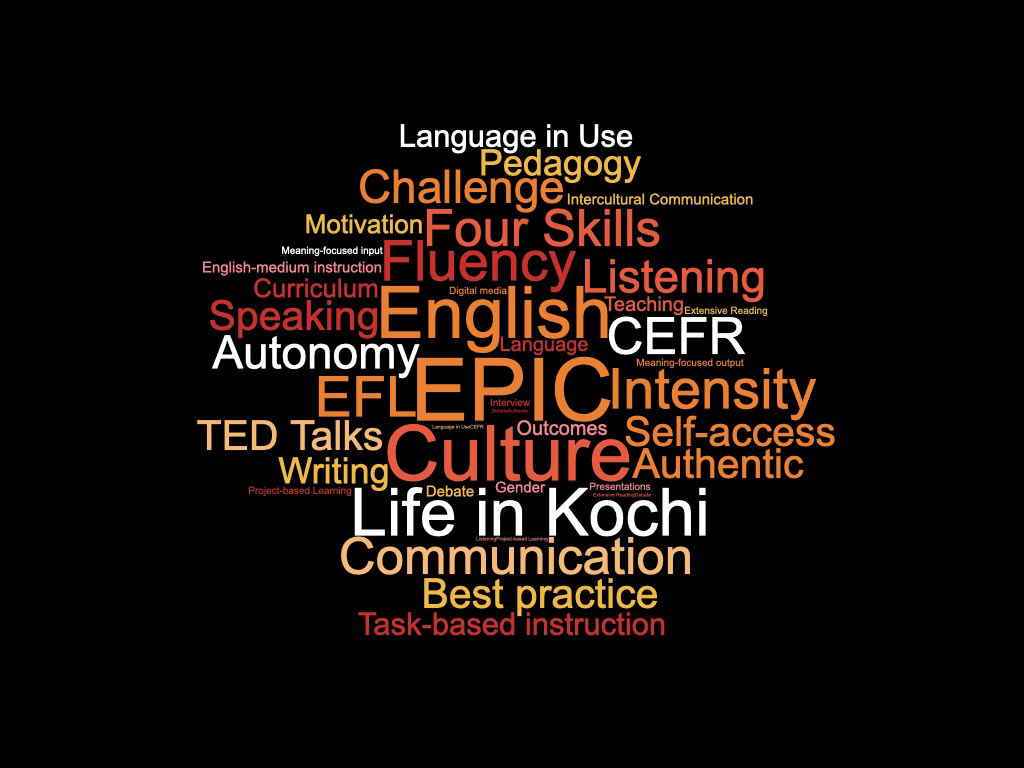
EPIC course work is challenging, but stimulating and rewarding. Each EPIC cohort begins their studies with a Foundation Unit that prepares them for EPIC study. This unit covers expectations about communication, self-access learning, assessment, and CEFR descriptors and outcomes. The six-course program covers the development of the four language skills and includes a variety of applied activities and projects. A core module of the EPIC curriculum is the 'Life in Kochi' writing project in which students publish stories about Kochi for a website that is viewed by people all over the world (https://lifeinkochi.net). Other modules require students to conduct interview projects with people in the community on themes such as raising bilingual children and the lives of local foreign residents. Language-skills projects are done in the EPIC classroom such as listening projects which require students to analyze authentic spoken language and present findings to the class. The English debate contest is another example of a classroom project requiring students to learn about traditional debating, prepare as a team, and compete in English. A key feature of EPIC course work is for students to work with a variety of authentic materials (newspaper articles, children's literature, TED Talks, contemporary media sources, gender materials, interview programs, films) to explore language and culture in meaningful ways. Learner autonomy is continually encouraged in EPIC through the Extensive Reading component, focus on CEFR descriptors, self-access study, dialogue journal writing, and maintaining learner portfolios.
The Life in Kochi writing project is a key part of the EPIC Program. The project is directed by EPIC teacher, Davey Leslie. Writing, whether in one's native language or in a learned foreign language, is something that is accomplished only through a series of steps. The final step is when writing actually gets published in public space. The Life in Kochi website gives EPIC students a real outlet for their writing, and gives them a sense that they are, in fact, writing for a wider audience than just their teacher. The hope is that the students will surprise themselves and discover that, yes, they actually can communicate something important and difficult in English. The most successful articles grow from a critical awareness of the local community and contribute, in a small way, to creating “the story of Kochi.” The Life in Kochi project, at its best, is an exercise in active citizenship. EPIC Students have something worthwhile to share and the Life in Kochi project provides a space to celebrate their English writing accomplishments. Thanks to Davey Leslie for his incredible contribution to EPIC and Kochi University students!
The Common European Framework of Reference (CEFR) is a clear objective way to describe English skills. CEFR breaks down language learning into six levels and explains what learners can do in English from Basic (A) to Independent (B) to Proficient (C). CEFR is used by learners, teachers, universities, governments, and employers around the world to describe English ability. CEFR-J is the Japanese localized version comprising “Can Do” statements with added subdivisions in the A and B competencies.
All EPIC courses are communicative in orientation. Setting target CEFR-J outcomes in speaking, writing and understanding keeps the teaching focus on language use. CEFR guides EPIC teaching, curriculum, and evaluation in five important ways:
EPIC typically attracts the following students:
EPIC serves the English language needs of Japanese students and full-time international students from countries such as Malaysia, Indonesia, Korea, China, the Philippines, Vietnam, Mongolia, India, and Nepal. The international mix of students enrolled in EPIC adds great linguistic and cultural diversity to the Program and keeps motivation high in terms of using English as the means of communication not only between teachers and students, but among students as well. While most EPIC students have typically come from the International Studies Course in the Faculty of Humanities and Social Sciences, students from other KU faculties, departments, and programs regularly enroll in EPIC too, adding a welcomed dynamic to the EPIC classroom. EPIC students typically display motivation to study English intensively, motivation to study English through English, motivation to study English with students of a similar level, and motivation to improve a specific skill or overall language skills. To enroll in EPIC, students must have demonstrated speaking and writing skills in English, and strong motivation.
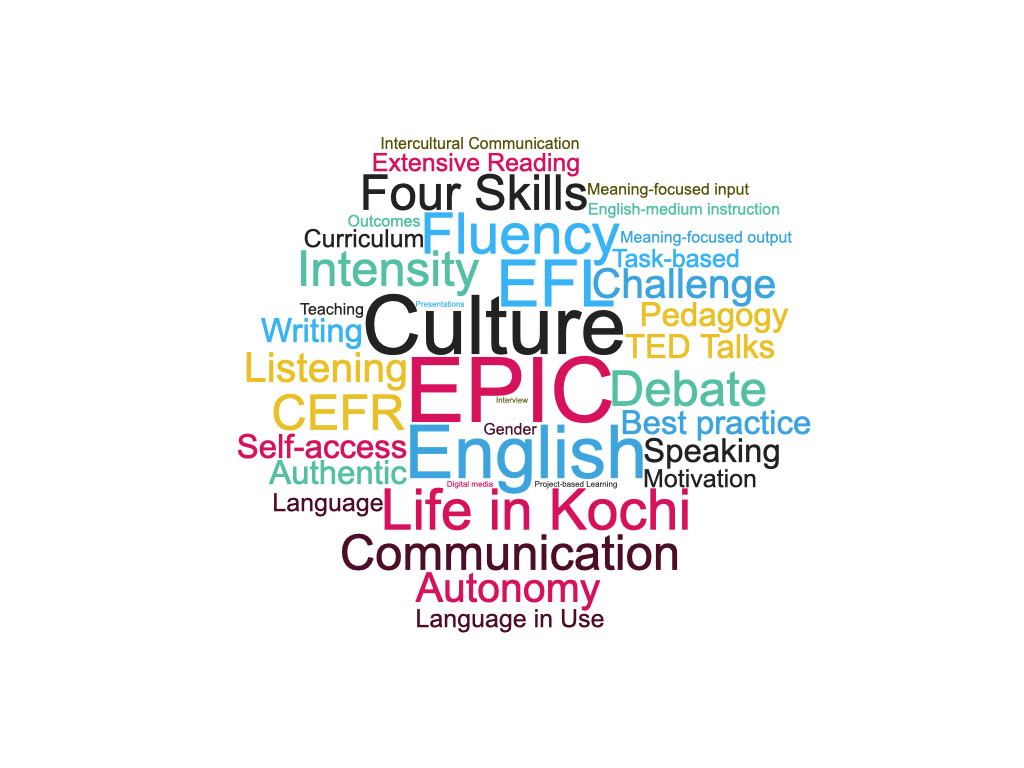
The EPIC program was not just an English class. It was an intercultural experience for me as well. Typical English language classes are often conducted by memorizing vocabulary through repetition or learning grammar. However, the EPIC Program was different. We didn't memorize words or learn grammar in class. Instead, we learned English through many kinds of activities and tasks such as discussion, presentation, essay writing, interviews, and other projects. What I learned most in this program was how to express my ideas in English. Through the tasks in EPIC, we always needed to express ourselves in English, and therefore we learned how to write or speak by using our own English knowledge practically. In addition to this, we were immersed in authentic English which was also very helpful for me. Most of the EPIC class materials were from English newspaper articles or documentary videos, and thus we could obtain a lot of authentic English input. Moreover, some of the materials were focused on intercultural topics and we could think about intercultural communication seriously and critically. In conclusion, EPIC is not just a program to brush up our English ability but it is also to learn and think about the culture of language and intercultural communication. I think such intercultural learning will help students who hope to study abroad after finishing the EPIC program.
EPICを振り返ってみると、私にとってEPICは単なる英語の授業ではなく、異文化間コミュニケーションを学ぶ機会でもあったように思います。一般的な語学の授業は、単語を暗記したり文法を学んだりする内容のものが多いように感じますが、EPICは全く違い、ディスカッションやプレゼン、作文、インタビューなどを通して英語を学ぶというものです。私がこのプログラムで得た一番大きな収穫は、自分の持っている英語能力を最大限活用し、自分の考えや意見を表現する方法を学べたことです。EPICの活動(ディスカッションなど)では毎回、自分の考えを表現することが求められたため、英語を書いたり話したりする中で実践的に語学力を高められました。また、学習用に編集された英語ではない、そのままの英字新聞やドキュメンタリー映像を通して英語を学べたことも、EPICを履修してよかったと思う点です。これらの生きた教材の中には、異文化間の様々な問題を扱った記事もあり、異文化間コミュニケーションについて考え、友達とディスカッションすることができ、他の授業やプログラムでは得られなかった経験ができました。最後に、EPICはただ語学力を伸ばすための授業ではなく、異文化間コミュニケーションについて理解し、考えを深めることもできるプログラムです。協定校などへの留学を考えている学生にぜひ、このプログラムをおすすめしたいです。
- 2015 EPIC Diploma recipient, Kaori Watanabe
Through the EPIC Program, students can learn four language skills using unique and interesting contents. We could learn real or authentic English from some materials in EPIC. I enjoyed all of the EPIC classes, and I could improve my English skills while having a lot of fun. It was sometimes challenging and hard, but teachers and EPIC classmates always supported me. Also, we communicated a lot through activities and projects, so EPIC members always motivated me to keep studying and using English. I think the most attractive point of EPIC is the student-centered learning style. When I was a high school student, I just listened to the teacher in English class, so most students were always passively learning. EPIC is completely different. Students are always at the center, so we have a lot of chances to use English. As I used more and more English in EPIC, I was also able to recognize my limitations. I could learn English more deeply through the EPIC Program, and this has motivated me to continue to study English more and more.
EPICでは、様々なアクティビティやプロジェクトを通して4技能を実践的に学ぶことができます。自分の高校時代を振り返ると、語彙や文法を覚えたり入試対策のために英語を勉強したりと、誰かとコミュニケーションをとるために英語を学ぶ機会はあまりなかったように思います。しかし、高知大学に入学してからは、ネイティブスピーカーの先生の授業を受けたり、留学生と話をしたり、英語でプレゼンテーションをしたりと、自分を表現するため、何かを伝えるため、理解するために英語を使う機会が増えてきます。EPICは、そんな私たちの学びをサポートしてくれました。4技能を実践的に学ぶことは、自信にもつながります。特にスピーキングに関しては、毎回の授業での会話や、授業内でのディスカッション、ディベートなどを通して、徐々に力がついていきます。また、グループワークを通して友人と一緒に学ぶことで、モチベーションが上がり、難しい課題にも挑戦することができます。私は、EPICを受講して、英語を使う楽しさを知ることができたし、今後の課題も見つけることができました。高知大学に入学し、EPICを受講して本当によかったと思います。
- 2017 EPIC Diploma recipient, Momoko Date
An advantage of the EPIC program is that we can participate in real English use settings, just like in foreign universities. At Kochi University, this is the only such course in which all instruction and communication proceeds in English. While Japanese students are often good at reading English, we are usually weak at communicating. This is due to the traditional English education setting. With limited opportunities to be in real English use settings, we cannot communicate well. However, this program offers a good solution to this kind of weakness. In the EPIC Program, everything proceeds in English - teaching, writing, discussions, interviews, debate, and presentations. I think that only in this kind environment can we polish our real communicative English ability.
EPICプログラムのいいところは、日本での英語教育が担ってないすきまの部分を補うことができる点だと思います。具体的には、ライティング、スピーキング、リスニングといったコミュニケーションに必要なスキルを伸ばすことができる点がその魅力だといえると思います。授業は、週6コマあり、すべて英語で行われるため、耳は鍛えられますし、聞かれたことに英語で返答しないといけない場面も多々あるので、即座に英語で考えて、話す癖もつけられるのではないでしょうか。また、授業で出される課題も、ブログ記事を書いたり、プレゼンテーションをしたり、ディベートをしたり、インタビュー動画を見てそれを文字起こししたりと多岐に渡り、これまであまり経験したことがないような教育方法が用いられたりしていて刺激的だと思います。高知大学にいながら、生きた英語が飛び交う環境で授業を受けることができる機会はかなりレアだと思います。英語の能力を高めたいと思っている方は、ぜひ受講してみてはいかがでしょうか。
- 2017 EPIC Diploma recipient, Taro Yabe
To receive the EPIC Certificate, students must successfully pass all EPIC courses with an assessment of B or higher, and be able to function at the B2.1 level or above in each of language skills on the Common European Framework of Reference Scales (CEFR-J). Each year a limited number of EPIC students is awarded the special Kochi University EPIC Certificate which indicates excellent work in the Program. Students receive their Certificate at a ceremony upon completion of the EPIC Program. The back of the EPIC Certificate provides specific details about student performance.
